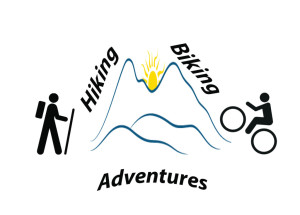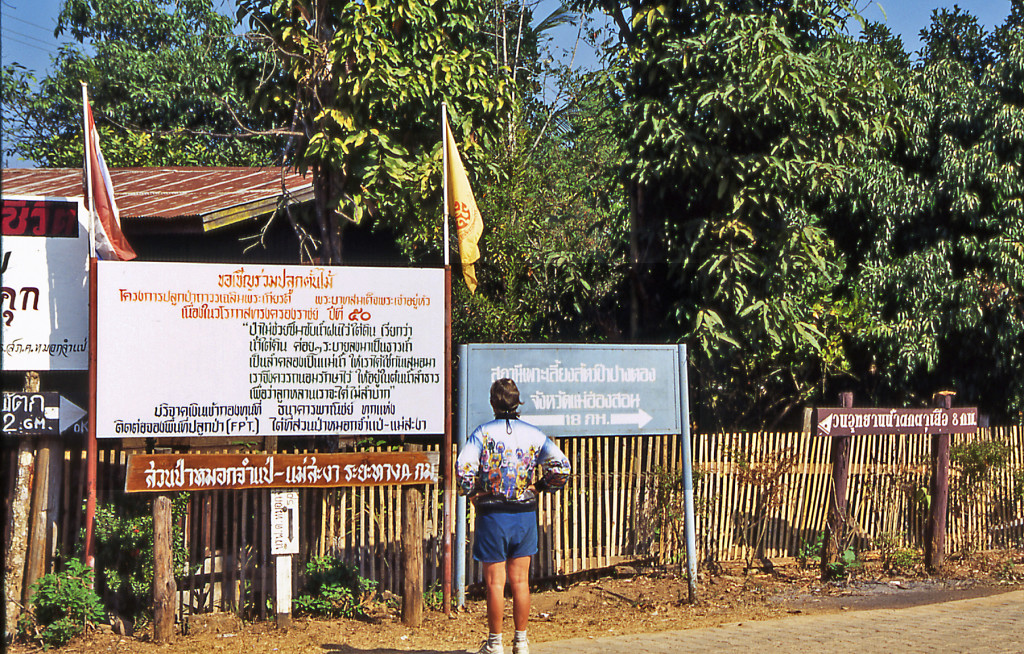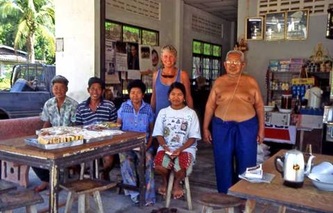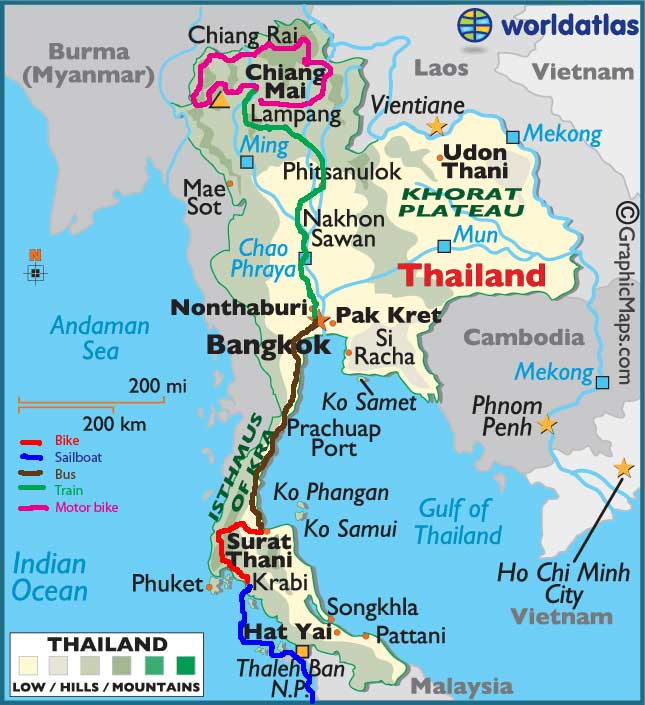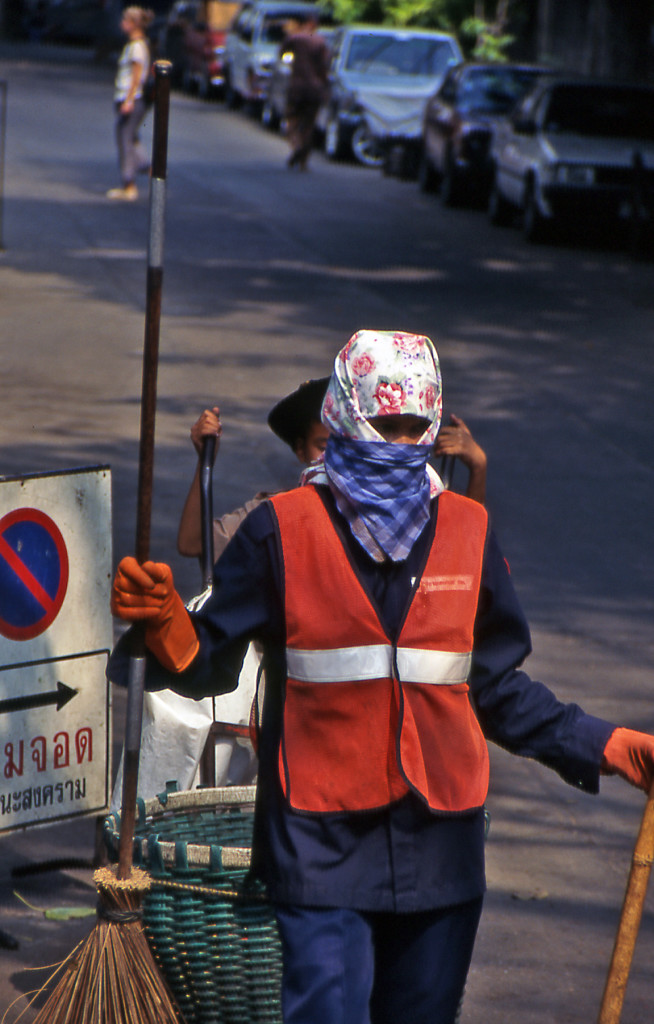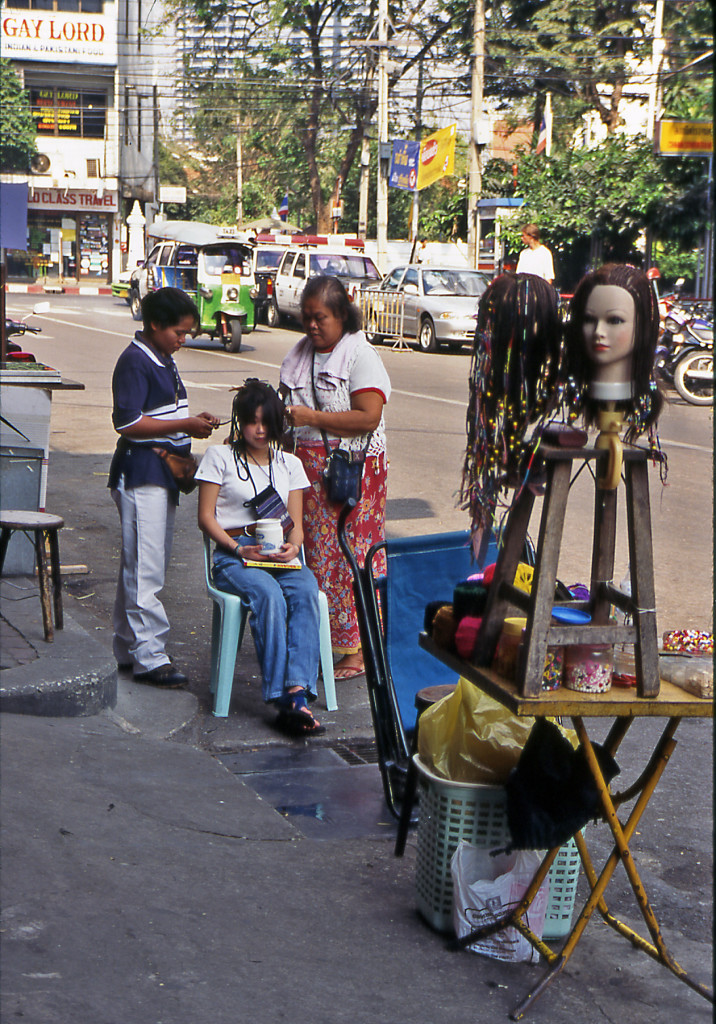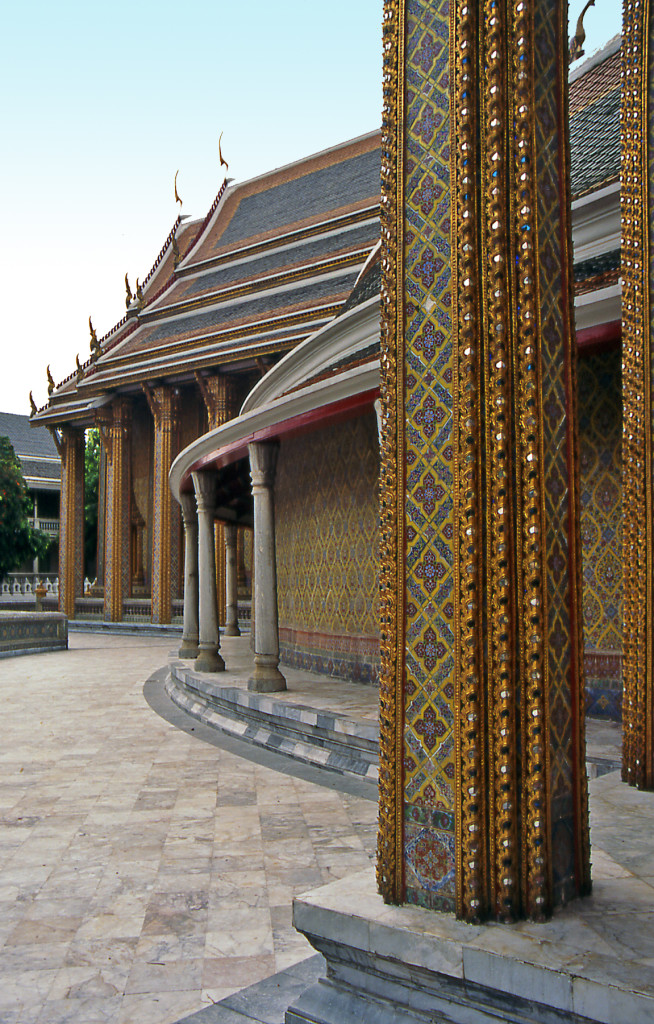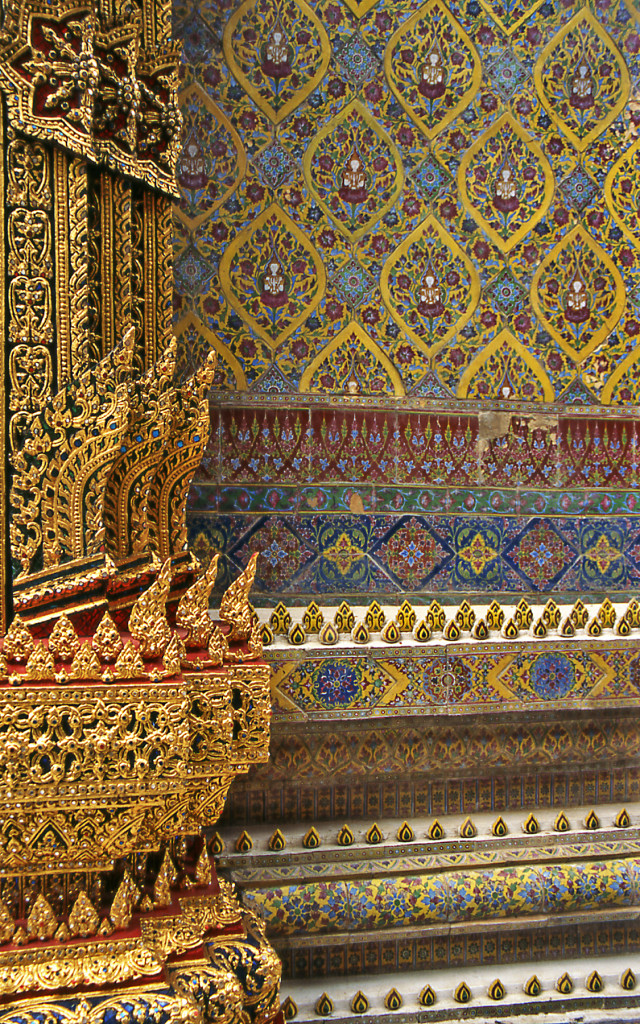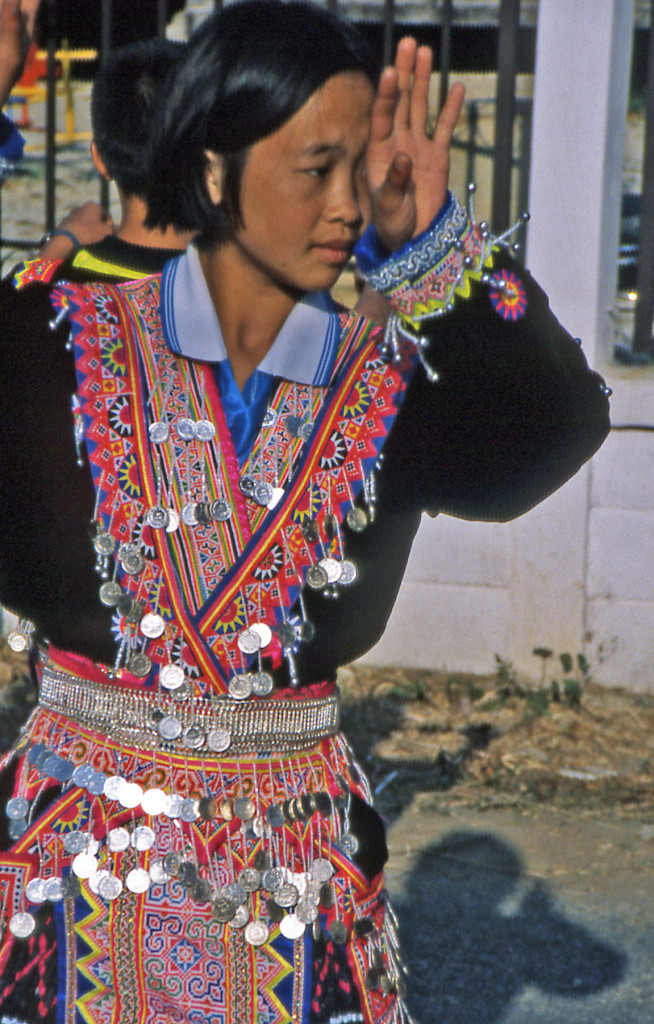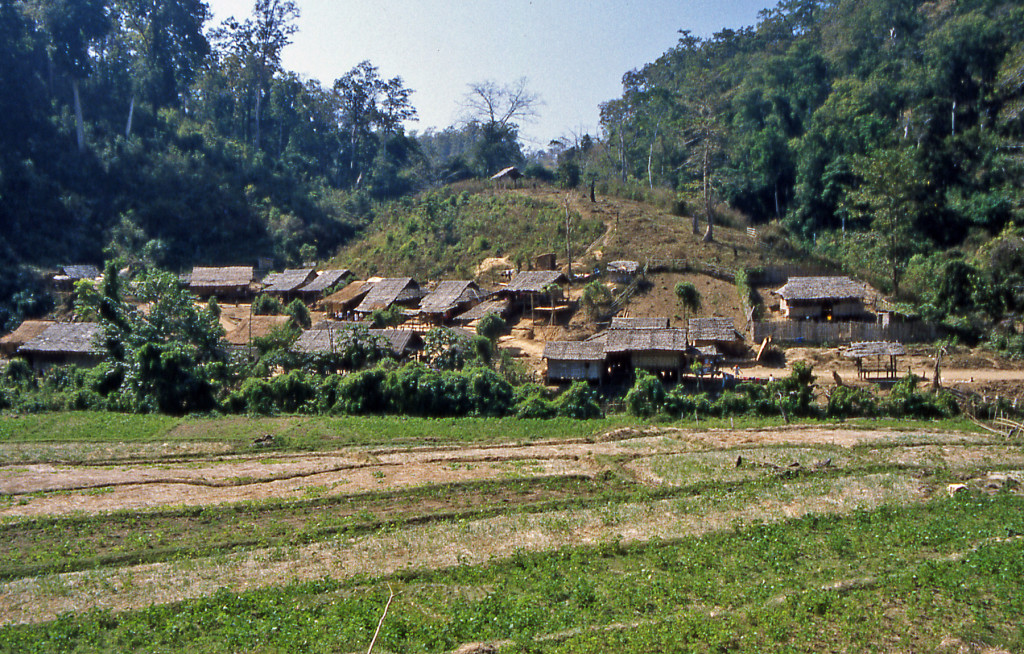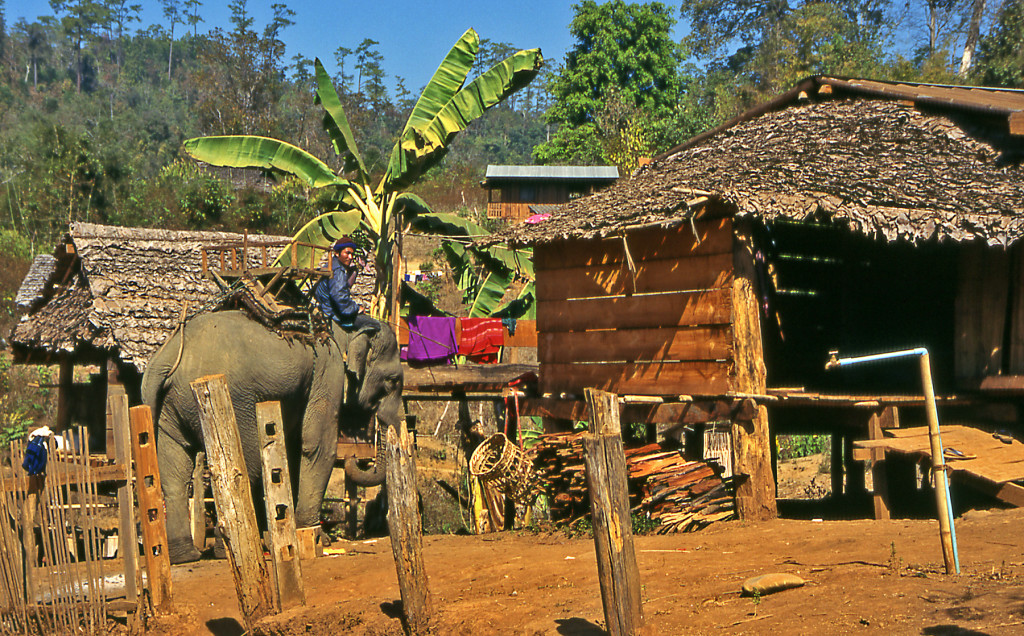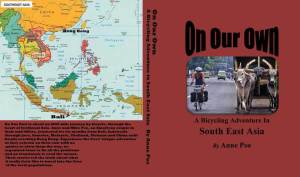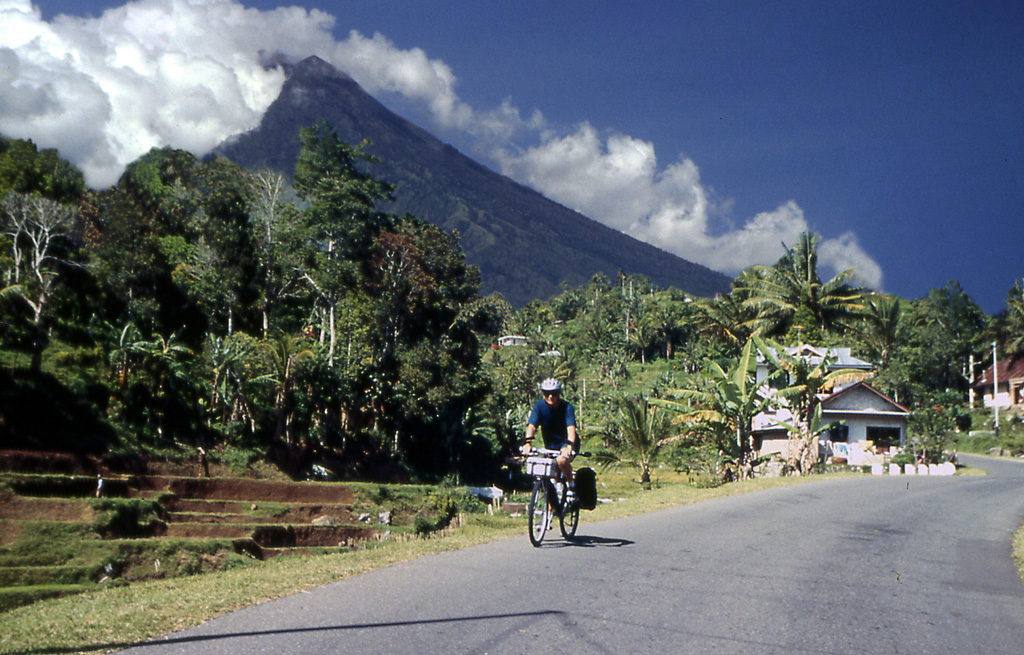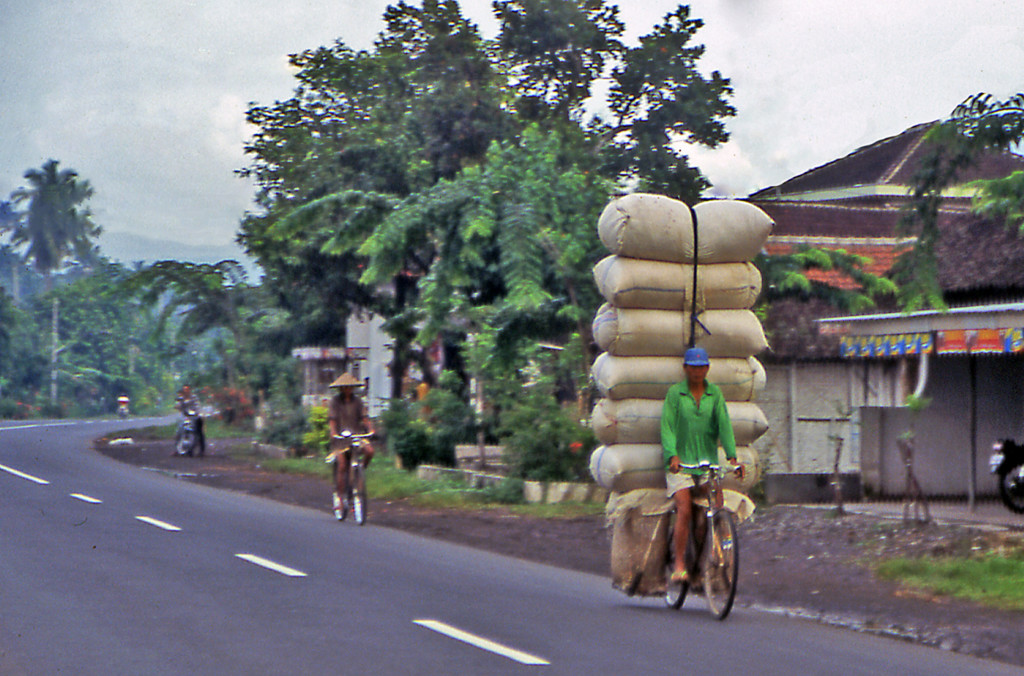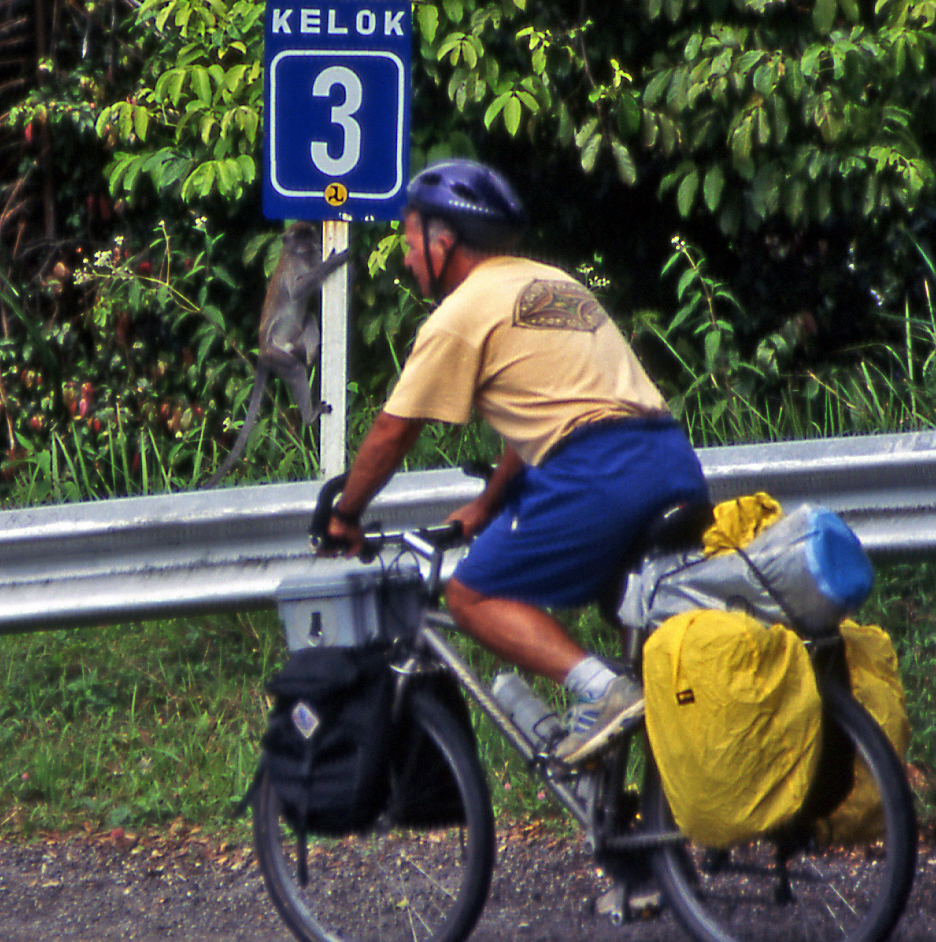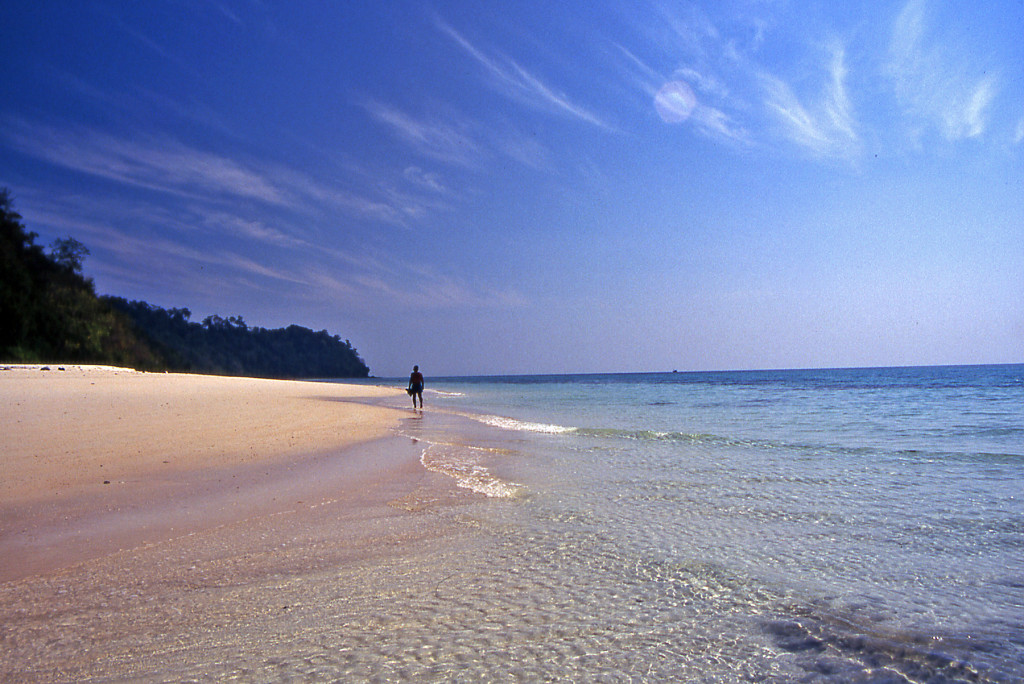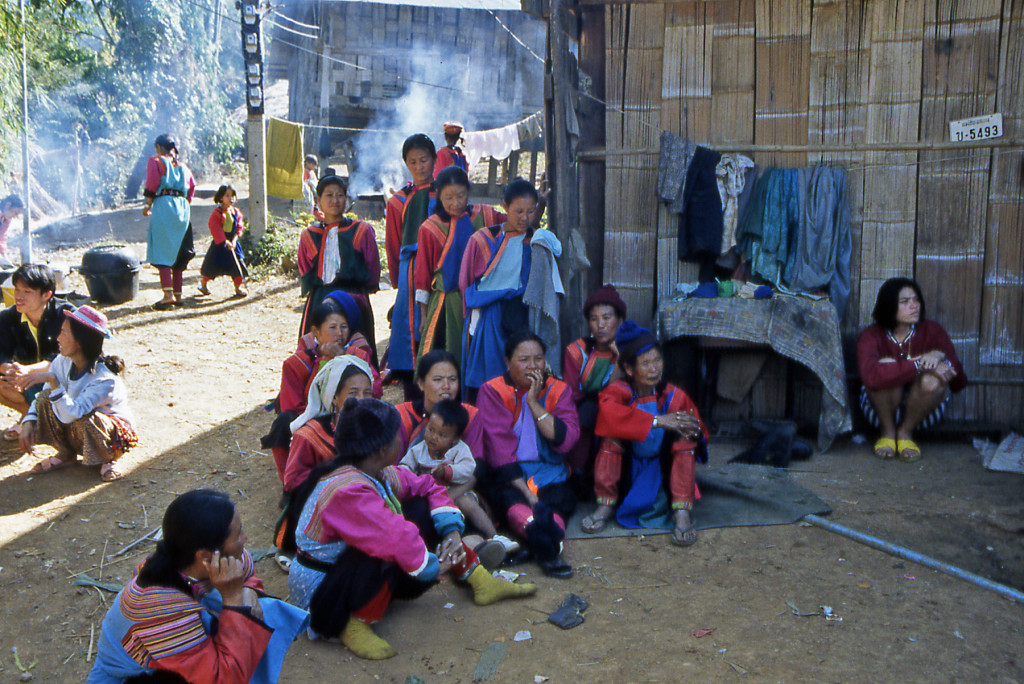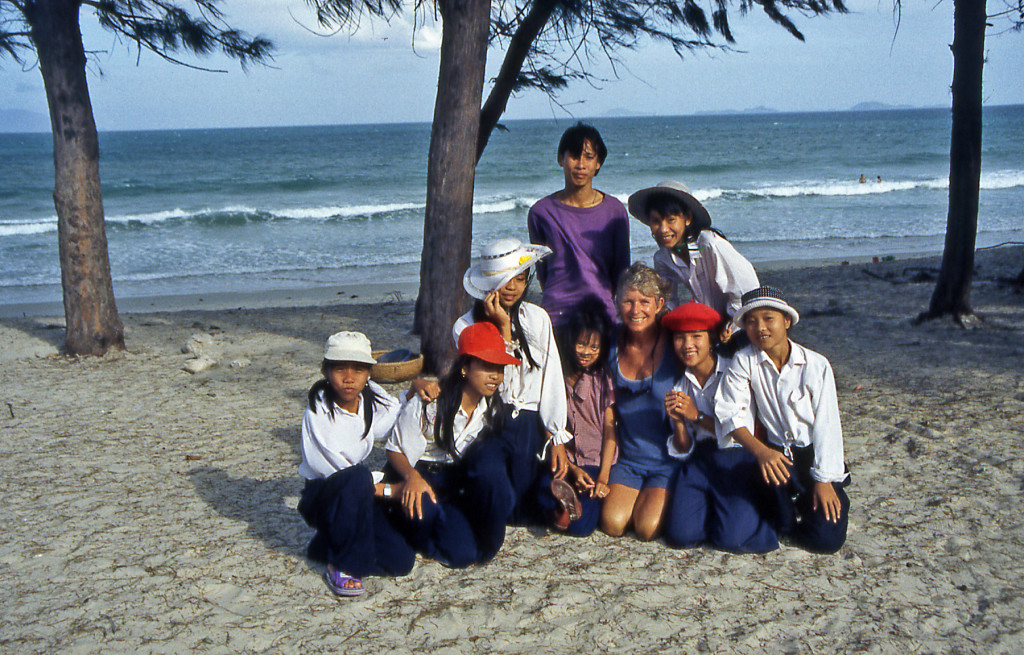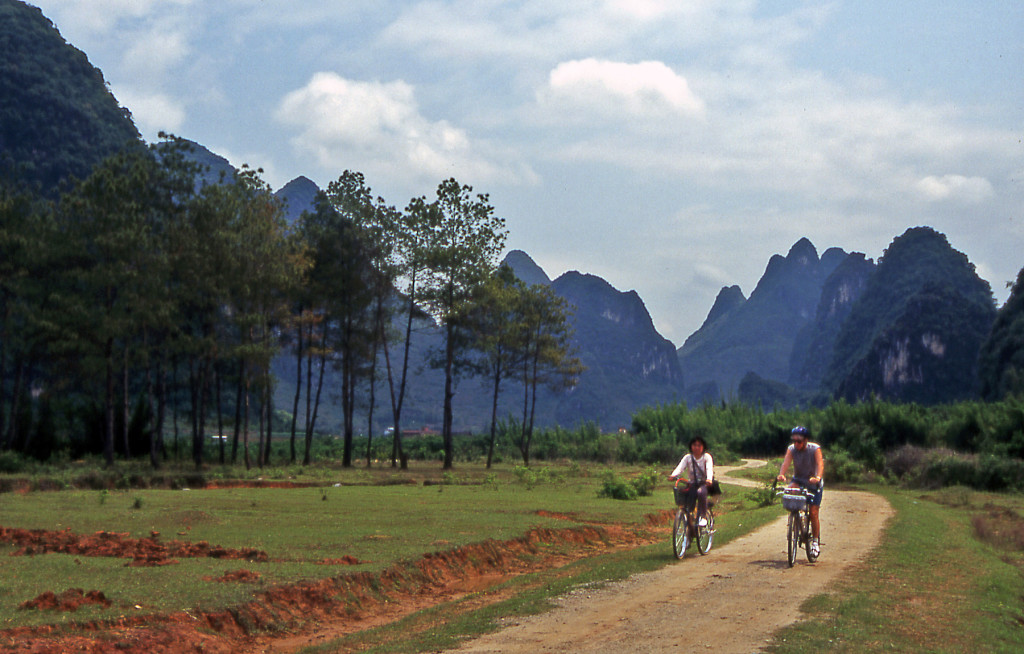Bicycling Thailand
The Southern Peninsula
Page Contents
“Thailand’s immigration officials dispatched us through Krabi with welcoming smiles. Off we pedaled into the excitement of a new land, new customs and a new language. Back to square one.”
Excerpts from On Our Own A Bicycling Adventure in South East Asia
by Anne & Mike Poe
” Southern Thailand burned under the tropical sun: dry, brittle and brown. Like a bony finger, it pointed its desolate way through the cool-blue world of the Andaman Sea and the temperate, moist Gulf of Thailand. Rolling hills, camouflaged under acres of dead and dying brush, flexed and braced against a rocky central spine. The wide ribbon smooth road wound carefully up, down and around through giant limestone-karsts sentinels.”
“Traffic rolled by in country-time; horns remained confined to emergency use only, or peeked out just long enough to say a quick “hello.” Then, for long interludes, we would have the smooth black ribbon to ourselves.”
“Three hundred-fifty miles to Bangkok, all of it was under construction. The two old southbound lanes, masticated into bits and pieces by giant mechanical jaws, lay buried under fresh piles of coarse gravel awaiting their destiny. Billowing clouds of concrete dust, blowing de-stabilized earth and acrid black diesel emissions set flying by the fierce gale winds, choked the two remaining lanes relegated to transporting both directions of traffic. Nose to ass, eager buses and trucks strained against their forced containment like cattle stuffed in a chute. Not a hair’s breadth could squeeze between the impatient vehicles and the sharp edge of the road. Bicycling was out of the question.”
Our one week bicycling Thailand came to an abrupt end, at Surat Thani. The highway all the way north to Bangkok was under construction. Dirt, dust, congestion, prostrating heat and blaring horns clogged the only route north. We decided to take the bus! What we thought was the Express turned out to be the local bus. It was a long, miserable ride in suffering heat and no air conditioning.
Bangkok
A Change in Attitude
“We arrived in Bangkok at 3 AM at a junction of crowded freeways and no sidewalks. No tourist information, no maps, no lighted streets. Three hours later we stumbled upon a hotel district. The kindly nature of the Thai people did not shine upon us. No one would rent us a room because we had bicycles! On we stumbled until we reached Khao San Road…THE TOURIST ZONE WHERE EVERYTHING GOES including politeness and a bit of basic honesty.
The station did not show on our city map. After thirty minutes checking out the surrounding neighborhood, all hope of finding a nearby hotel faded with the setting sun. Darkness and confusion led to indecision. High-speed commuter traffic roared by bumper to bumper. Finally, we chose the safety of the narrow sidewalks and rode up, down and around looking for clues to our whereabouts: street names we could read, a friendly English-speaking rescuer we could ask.
“Very far!” He answered. “Maybe five mile. Other side city. Khao San Road.”
“OK,” Mike said. “Now we know we are not near the hotel area. Which way do you want to go for five miles?”
I picked the biggest road with the heaviest traffic. “That way! It has to lead into the city center.”
Nothing “has” to do anything. Desperation makes it easy to believe it. We went “that way”, negotiating broken sidewalks littered with sidewalk-businesses, single-minded shoppers and silk-wrapped prostitutes displaying their wares. As we neared the brighter lights and taller buildings, more indifference acknowledged our questions.
“Khao San Road?” we asked. Shoulders shrugged. Faces turned away. We moved on toward the lights, until we reached the river. All roads led to one giant arching bridge. Traffic snarled and snapped impatiently. Our sidewalk disappeared; the surging flood of vehicles usurped its space. “There it is!” Mike pointed. “Over there!”
Our sidewalk hung in the air, four flights up! We coaxed our heavily burdened bikes up the countless steps. Reeking urine readily absorbed by the concrete railing companioned our efforts. Dripping humidity carved sweat rivulets down our backs; Bangkok’s chemical thick air stung our panting lungs. The price of progress! The other side of the bridge deposited us into the bright lights of Bangkok’s tourist district.”
A “Must Do” activity while in Bangkok is a visit to any of the many beautiful Buddhist Temples in the city. But beware of the scam artists.
“Why don’t you go Tuk Tuk? One hour. See temples. I can arrange.”
As I wanted to see some temples I invited the stranger to continue with his offer. Mike withdrew to stare patiently at the sky. He had heard such approaches before and could sense the wolf in shepherd’s clothing. A hungry eagerness grabbed the tourist map from my hand.
“You go Wat here.” He circled a spot on the map with his marking pen parked conveniently in his lapel pocket. “Then this Wat with biggest standing Buddha in all Thailand.” Another black circle captured a spot on the map. “Then go Marble Wat. Take one hour. Tuk Tuk only twenty baht!”
Twenty baht ($1.00) was a ridiculously low price for one hour in a Tuk Tuk. I knew that he had more up his sleeve, but he was waiting for me to make the next move.
We won’t go to any shops!” I said firmly.
“Shops! No, no … no shops!” he stammered unconvincingly. I had hit the punch line before him. He needed a moment to regroup. Still, he seemed well prepared for difficulties.
“No problem … no shopping. You only go Trade Center.”
He circled another spot on the map, all the way on the other side of town.
“Today only! Special promotion. You understand special promotion?”
“Yes.”
Chiang Mai & the North
Thailand’s Adventure Tourist Destination
We did not have the time to cycle to Chiang Mai in the far north. We decided to take the train up and back and instead spend our time there exploring the Hill Tribe areas. This was the Thailand we came to see.
Foreign travelers flock to Chiang Mai, the sentimental capital of Thai and mountain tribal culture, to immerse themselves in all that they can find different from their home environment. Chiang Mai explodes with authentic cultural variety through food, dress, belief, language, lifestyle and art. To the seasoned and new traveler alike, Chiang Mai is the journey.
We unloaded from the train and rode our bikes into the old city.
That’s when Mike saw them. A yard full of red Honda 90 cc motorbikes. He had long desired to motorcycle around a strange country. These bikes were too tempting. At $1 per day per bike, we could hardly pass up the fun.
We loaded a few belongings and instead of cranking the pedals, we simply twisted the wrist! Wow, what a feeling of power!
Off we went on a loop route through the mountains along the Burmese border, through Chiang Rai then back to Chiang Mai in 10 days.
The great influx of tribal peoples from southern China into northern Thailand began around 1800. Persecuted by the Han Chinese for centuries, Hmong, Lahu, Lisu and Karen migrated steadily southward much as the Thai did, and spread throughout northern Burma, Thailand, Laos and Vietnam. Distinctly different from each other and from the Thai, they now make up the cultural spice that is northern Thailand. We headed into their country with no specific plans or destinations, no guide or tourist package. We preferred to discover on our own.
Local lodging and eateries were easy to come by; there were tourist lodges as well. Nothing was expensive; everything was clean and sanitary. We dabbled in all the hidden, magical places we could find.
“Since we did not arrive in the village by the normal route, we were a little unexpected. We startled a Karen mother giving her two tiny sons a bath in a washtub. Her clothing astounded us. Though going about menial chores, she wore the most elegant jet-black skirt with a garden of colorful flowers woven all around. Her black long sleeved tunic with brilliant red cuffs and neckline set off her olive skin. Her rich black hair showed briefly from under a long red and green turban that reached to the ground.
Our unannounced entrance brought the village men to question our intentions They scurried over from all directions. I felt we might have committed an offensive gesture by approaching this woman in lieu of asking permission to enter the village. Since we were tongue tied by both Thai and Karen, we stood there feeling helpless and ridiculous. I felt, at that precise moment, like the ultimate tourist intruder.
The rushing men skidded to a stop and formed a circle around us.
Silence erupted.
Mike stuck out his hand and offered a smile. A middle-aged man, built like a brick ~ compact, solid, hard ~ stepped forward and extended his grizzled hand to meet Mike’s.
Their eyes met. Each wondering about the other; each searching for a way to communicate as their hands remained locked in a mutual vice-like grip.
“Can you ask permission to visit the village?” Mike queried me without releasing his hand or gaze.
“I haven’t found any phrase like that,” I replied in frustration. “Maybe this is why tourists hire guides!”
“Can you ask him about hiring an elephant ride?” Mike was searching for a way to show our friendly intentions.
“The book doesn’t have the word for elephant! Try English.”
Mike broke the vice-grip handshake and made his arm into an upward curving trunk.
“Ele-phant,” he said slowly, clearly.
The men’s stares moved from one to another. A young boy broke ranks and fled up the dusty street. Mike improved on his elephant by adding ears and a roar. The circle of men new by now we were daft!
A half hour later, we broke out of the forest into a dry and brittle slash and burn opening. About an acre in size, it supported the remnants of a meager corn crop and fifteen or so ramshackle huts.
“Refugees from fighting in Myanmar,” Kit explained. All Longneck Karen people. Must pay to go inside.”
“Must pay!” We did not understand.
“Thai Government want to stop poppy crop. Set up villages for people, charge money to tourist to photograph. Big business. Make much money for people.”
It cost ten dollars U.S. per person to go in. Such high fees have paved many roads into remote villages, built schools, houses and water systems. We paid for the tickets to go in. Our contribution to progress and betterment? It hardly seemed that way. We felt like we were perpetuating the degradation of a people to life in a zoo, but we were not Longneck Karen refugees fleeing from the despotism of Myanmar’s military dictatorship. We tried to pry open our pre-conceptions and perhaps discover a different point of view.
The young fleeing boy returned on the heels of a man dressed in Thai pants and western shirt. How many times (I could not count) have our inadequacies been rescued by native peoples who have made the effort to learn OUR language.
“My name is Kit,” the just arrived man said as he offered his hand to Mike. “How may we help you?”
Suddenly transported from dimwits to intelligent appearing human beings, we latched onto Kit’s English abilities like a drowning man to a lifeguard. It felt good to stand on firm ground.
“We would like very much to hire an elephant ride,” Mike said to Kit. “Would that be possible?”
“Elephants working now in log camp,” Kit replied. “But two in our village now must go back to Longneck Karen village one hour from here. If you like, we can go by elephant, return walking.”
We arranged a price with Kit. He would be the elephant’s mahout and our guide.
“The Karen people thank you,” Kit said thoughtfully as Mike counted the money into his hand.
Native dress was the only tradition the people in this village were able to keep. From infant to grandmother, Longneck Karen women wore a spiraling necklace of plated gold that sat upon their shoulder blades and corkscrewed upwards to their ears. Each birthday added a new ring and new length to their necks. No one seemed to know how the tradition got started. The most oft heard explanation we heard was a beautification process.
And so, we left Thailand,
taking the train back to Bangkok
and flying to Vietnam, Ho Chi Minh City.
Copyright Material
All rights reserved. No part of this page may be reproduced or utilized in any form by any means, electronic or mechanical, including downloading, print screen, photocopying, recording, or by any information storage or retrieval system, without the prior written permission by the copyright owner.

